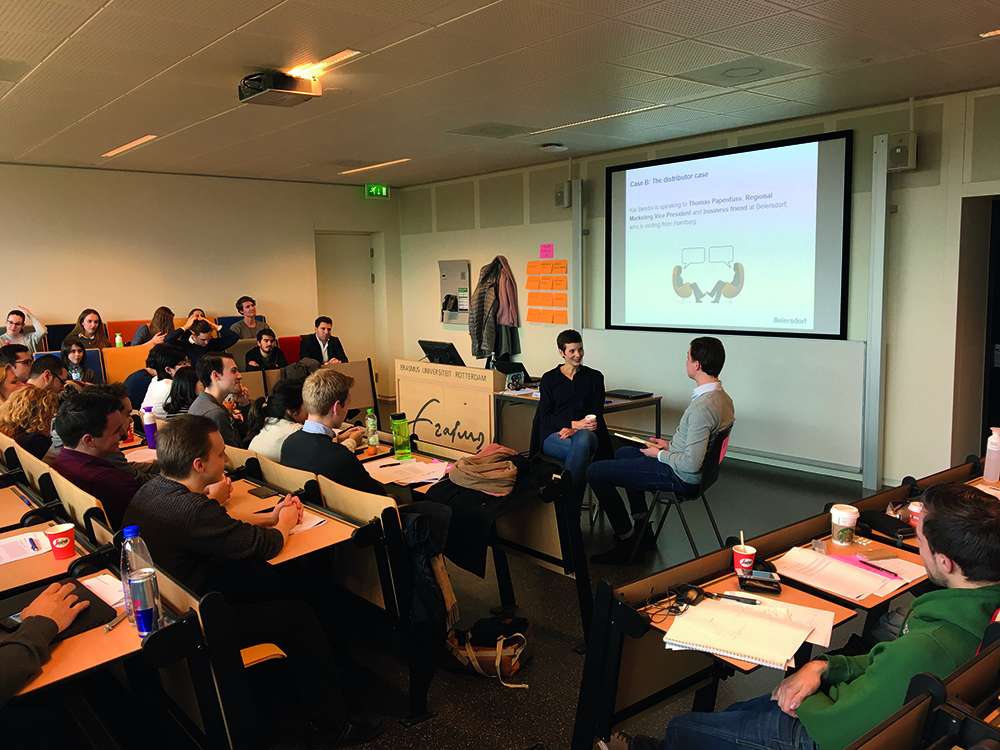
Calls for greater responsibility, transparency and integrity in leadership both from incumbents and future leaders are backed, as research from CEMS schools is showing, by good business sense. Next-generation leaders with the mind-set and commitment to deliver these qualities are already at high premium among employers like Beiersdorf and A.T. Kearney.
What kind of person will be leading business 10 years from now? Will the future CEO lead from the head or the heart? What are the kinds of competencies he or she will need to bring to their leadership?
These questions form the core of a recent Future CEO survey conducted by a Finnish consultancy company, Seedi in collaboration with Rita Järventie-Thesleff, Professor of Practice and CEMS Academic Director at Aalto University School of Business in Finland.
“There’s this dichotomy in the way we think about leadership – especially in these shifting times with digitization challenging the traditional ways of doing things and international trade prone to uncertainty,” she says.
“On the one hand we look to all-knowing superheroes who make every decision. On the other hand, there’s a growing call for leaders that can nurture and coach others in their growth and decision-making.”
To understand how leaders themselves view this conundrum and to shed light on the development objectives CEOs feel they need to set themselves, the Future CEO survey collected the views of 250 respondents across a diversity of Finnish corporations employing more than 100 people. In addition to CEOs, a number of board members and members of executive teams participated in the survey.
Professor Järventie-Thesleff then extended the survey to CEMS students in order to contrast the findings and gain insight into how nextgeneration leaders see the future of leadership. And the findings are fascinating.
The Future CEO
“While the prevailing image of current CEOs among the CEMS students was relatively traditional, emphasizing the CEO’s ability to create a vision for the company, have charisma and possess good communications skills, the list of important future competencies was even longer. Future CEOs were expected to master analytical tools and approaches, be customer driven, be accustomed to social media and show a strong focus on sustainability related issues.”
“But most importantly, the CEMS students are calling for a higher prioritization of personnel – leaders that empower others, that care about employees well-being and that set higher bars for inclusion,” says Professor Järventie-Thesleff. “Among CEOs there is also a general feeling that the time is right to let go of hierarchical frameworks and to adopt a more open, engaging and involving leadership style – to act as leaders who emphasize teamwork and see their entire personnel as the major strength of their organizations. And in terms of company culture, there’s a strong sense of the imperative to respond to disruption by being open to greater risk and failure.”
A call to dismantle what CEOs call the “ivory tower” of the C-suite and bring leaders closer to people in order to better “energise them and motivate them to be best versions of themselves”, says Professor Järventie-Thesleff, finds echoing volleys in the response from the CEMS students surveyed.
Where incumbents prize charisma and visions – the superhero visionary that still characterizes current thinking to a degree – Millennials, however, place greater value on “empathic, open-minded and inclusive leaders,” says Professor Järventie-Thesleff.
“CEMS students put high stock on things like the environment and sustainability, but also on openness and inclusion. They envision a future leadership style where people are at the centre, and where the bottom line is better served by inclusive decision-making about strategy and the development of products and services.”
Building this kind of leadership culture, according to the students, could even be served by introducing psychology-based training or toolkits that help leaders to become more reflective and better at conflict resolution.
Professor Järventie-Thesleff’s research finds interesting parallels with research conducted by Sam Yam Kai Chi, Assistant Professor of Management & Organisation at National University of Singapore Business School.
Treat them all nicely
Professor Yam has led studies of how the interactions between leaders and subordinates impact productivity. And his findings concur with what CEMS students highlight in terms of prioritizing a more “psychological” approach to leadership.
“We looked at how employees watch their bosses as they interact with all their staff – including non-staff, to determine if there’s a knock-on effect on productivity caused by inconsistency. And the findings point to a clear business case for treating everyone with respect.”
Professor Yam’s study shows regardless of how well a boss treats one employee, that employee’s perception of that boss will be coloured by how he or she treats all the other employees in their charge, including subordinate staff. And inconsistency in treatment of personnel across the board, says Professor Yam, can be seriously detrimental to motivation, effort and productivity.
“Leaders tend to think rationally, and traditionally in business there’s this tie between paying people well and getting more performance from them. But it’s not as simple as that. Psychology shows us that human beings are not always rational – we are psychologically complex. As a boss, if you are pleasant to one worker but a jerk to another, that first worker is likely to try to second-guess your motives and will be wary of you. Employees are people – they think like people. And callous or inconsistent behaviour can cost leaders the esteem of their whole staff.”
This risk, says Professor Yam, can directly impact the bottom line.
“Our research shows that inconsistency of behaviour and fair treatment across your personnel can see a significant drop in productivity. So the business case is clear: treat everyone with respect or watch your business suffer.”
Leadership, says Professor Yam, might be better served in the future by a shift from rational thinking to thinking more as a psychologist might.
Future leaders, he says, might want to focus less on being “instrumental” and more on how the relationships they build and greater inclusivity can move their entire team forward towards the realization of business goals.
An enhanced focus on inclusivity in leadership development also informs a unique collaboration between skin care multinational, Beiersdorf, and the CEMS Global Management Practice course delivered to students in Cologne and Rotterdam. A collaboration, as Imke Junk, talent relationship manager at Beiersdorf explains, that is built on role-playing.
“We deliver a business decision-making simulation to students drawing from a real-life case study around the experience of a Beiersdorf manager opening operations in India. The goal is to have students really experience the kinds of strains, challenges and insecurity that come with decision-making in cross-cultural leadership, and to dig deep into their own perspectives and attitudes to what it means to be an inclusive and responsible leader of business.”
Role-playing responsibility
The role play is an intensive day that challenges students to apply the theory they have learnt in class to the real-world problems faced by Kai Bendix, GM for Beiersdorf subsidiary, NIVEA.

Leading operations in India saw Bendix grapple with cross-cultural sensitivities, personal organisational ethics and the challenges that come with issues like bribery, says Imke Junk, and CEMS students have to put themselves in his shoes to make decisions that will have far-reaching impact.
The experience, she says, is “powerful.” It obliges students to reflect on their own values as they push the business forward.
“When a real company comes into the learning process with a challenge, it sets a new precedent for students to come right to their boundaries. They realise that it’s not just about knowledge and hard skills. It’s about the soft skills and the set of values that will help you navigate the sensitivities around really complex issues – like how to manage bribery in a multinational setting.”
For the students, says Imke, there’s a watershed moment when they understand that responsible leadership is not a “question-answer game.”
“You have to stand for something, remaining open and inclusive as you adjust to whatever challenges come your way. It’s about leading yourself wherever you go.”
For Beiersdorf, the collaboration is a chance to “model the kind of responsible leadership we aspire to and look to recruit. There’s a great pleasure in being close to next-generation leaders, and being part of that learning process as the lights go on and they connect the dots.”
Mirko Warschun also has experience of seeing CEMS students’ potential come to fruition.
The Value of Values
Mirko is partner and Head of Consumer Industries and Retail, EMEA, with A.T. Kearney. He is also a member of the Global Strategic Board at CEMS. Every year, A.T. Kearney recruits a number of CEMS graduates as consultants, a choice, says Mirko, that stems from an appreciation of their “value and qualities as future leaders.”
“Our collaboration with CEMS across skill seminars, business projects and recruitment goes back well over a decade, and we find that graduates fit very well into our culture. They bring an understanding of the lessons learnt from the mistakes of their predecessors – lessons about integrity, about the importance of diversity, a commitment to sustainability and being transparent about what they stand for.”
That said, the next business generation will face a raft of unprecedented challenges arising from what Mirko describes as three “fundamental pressure points” – geopolitical, social and technological shifts that are reshaping the business terrain globally.
“We’re seeing huge demographic shifts around the world, a growing hyper-connectivity driven by digitization that is in turn driving the rise of the influencer model, and then there is the changing understanding of values themselves. There is a shift in what matters to consumers – to people. Increasingly, as consumers, we want to know about the values behind business products and services.”
And this is particularly true in the retail sector, he says. As the cost of switching between brands remains low for consumers, other dimensions such as how a company is perceived – its reputation for ethical or non-ethical behaviour, its commitment to social responsibility – have greater importance in the market.
“The potential negative impact of nonresponsible behaviour is probably greater than ever before,” says Mirko. “Because people are online 24-7, no matter how well something is hidden, it’s going to be detected sooner or later. So leaders in any sector need to have responsibility at the top of their agenda.”
Like every generation before them, says Mirko, today’s young leaders will “make mistakes.”
The key to anchoring those mistakes in learning and moving forward positively is developing and cleaving to a “strong set of values.” And Mirko sees a clear opportunity for the worlds of academia and business to collaborate closely in this.
“Today’s business students can learn a lot about the consequences of good and bad corporate behaviour, not only from seminars and case analysis, but also from real-world exposure to companies and to decision-makers. This is an area of collaboration, for instance, between A.T. Kearney and CEMS, where we work together with students on business projects that bring them up close to the real dynamics at play in every day decisions. It’s important that students meet and interact with people from different institutions so that they learn and understand the challenges they are working with.”
For future leaders themselves, Mirko has this advice: “keep your mind open. Stay connected to academia and to business. And think deeply about how you can have impact: not only in terms of your employer or your business, but also in the sense of how you can impact your society. Because this is your responsibility.”

![]()
![]()
